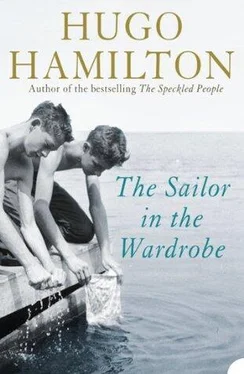When the concert is over, I watch him closing the cabinet and wonder where he hides the keys. He waits till everyone is out of the room before he puts them away, so it takes me weeks to find them. I keep looking everywhere, while he’s out at work. I start thinking just like him and imagine where the best place would be to hide something from your own son.
Inside the big speaker, of course. In the vent at the bottom, to the left. While I’m at home on my own one day and everybody is out of the house, I go into the front room and open everything up to put on my own record, not one of the German records or any of the Irish songs, but one that I bought myself some time ago with money saved up. It’s a Beatles single called ‘Get Back’. I prefer the flip side, though, which has John Lennon singing ‘Don’t Let Me Down’. I used to play it whenever I could on the small turntable before that broke, but now I want to hear it properly, on my father’s new system, as if the Beatles are in the front room with me.
I have to be very careful because even if I leave the tiniest thing out of place, he’ll know that somebody has been interfering with his things. I have to become a real criminal. I have to take a photograph in my mind of everything I touch so I can put it all back exactly as before. Then I place the record on the turntable and turn up the volume. ‘Don’t Let Me Down’. I play it again and again so that people can hear it all over the street and they must be thinking it’s strange that my father would be at home putting a song like that on his new music cabinet during the day.
It’s like blasphemy, even hearing the words in our house, saying ‘you done me good’.
The song gets more perfect every time I listen to it. I sit back in the armchair and see the girl across the street leaving her house and I know that for a few moments she must be listening to the same song as me, until she walks around the corner out of sight. Music makes people look weightless. I imagine my mother and father floating around the front room like astronauts every evening while they listen to Mozart. I can see them drinking glasses of cognac without having to hold them. Family photographs of Onkel Gerd and Ta Maria lifting off the mantelpiece up into the air. Franz Kaiser and Bertha Kaiser in Kempen floating like an ascension with the market square and the church with the red roof below them. The whole family including Onkel Ted with his white collar drifting up the stairs. All kinds of vases and table lamps and pencils and books about German and Irish history flying around under the ceiling. Now it’s me listening to John Lennon and it feels like the whole world has become weightless. I feel no gravity and my feet go up onto the side of the armchair. I’m drifting out the window. Floating down the street, up above the roofs of the houses and the church, looking down at the people standing at the bus stop. Up and out and down over the harbour where I can see the lads sitting on the trellis outside the shed and Dan Turley fishing. Out across the sea I go, floating away until the place I come from is only a tiny speck below me.
Afterwards I have to put everything back. I forget nothing. I lock everything up and place the keys back inside the speaker vent in exactly the same shape as I found them. Nobody would ever know, and by the time my father comes home the echo of John Lennon is long gone, remaining only in my head and keeping me afloat.
At the dinner table, my father gives me a look of deep suspicion, as if he knows I’ve done something. There is a frown on his forehead, but he can prove nothing. He would have to take fingerprints. I’m innocent and untouchable. He knows that I’m breaking away now but there is nothing he can do about it. He knows that I go down to the harbour every day since the summer began, speaking English like everyone else and no longer loyal to his crusade for the Irish language. He knows that I don’t want to be Irish like him, that I don’t want to look like him or even listen to the same music or read the same books. I look back across the table at him, speaking English in my own head, repeating the forbidden words ‘she done me good’.
And then I remember something that brings me back down to the ground again. I realize that while I was paying attention to every detail, scrupulously putting everything back in its place, I must have forgotten the most important thing of all. I left John Lennon on the turntable.
Now there’s going to be trouble. I can feel the weight of my arms on the table. I’m such a bad criminal. I go back over everything step by step. I know I turned the speed from forty-five back to thirty-three. I know I locked each and every one of the compartments. I did everything right, down to the last precise detail, but I was concentrating so much on replacing everything that I forgot the most obvious thing. When my father goes to play music after dinner, he’ll find a strange disc on the turntable that he would never in a million years allow into the house.
I stand up from the table in a panic. The chair makes a yelp behind me and I rush around past my mother to get to the door. Everybody looks up thinking I’m going to be sick. They stop eating to see me running past, trying to get away as fast as possible. I want to rescue John Lennon. I want to run to the front room, take out the keys quickly and remove him from the turntable before it’s too late. But then I stop at the door and look back at them all sitting around the table as if they have become frozen in time. My brother Franz has a piece of carrot stuck on his fork which has stopped halfway up to his mouth. My mother has a jug in her hand but the milk has stopped pouring. My sisters are all shocked with their eyes wide open and Ita’s mouth is full of mashed potato as if she’s blowing up a balloon. My father is getting ready to follow me. He puts his knife and fork down with a clack. His backside is raised up from the chair, in mid-air.
It’s a race against time. I know it’s futile because he’s bound to get there before I’m halfway through. No matter how fast I am, he will surely catch me putting away the keys or coming out with my hands behind my back and the disc under my jumper. It’s no good and I turn back. I walk all the way around the table to sit down again and now they’re all wondering why I’m suddenly not in a rush any more. I want to explain that I thought I needed to go to the bathroom and it’s no longer that urgent. But I say nothing. My face has gone red and I feel heavy in my legs. I try to think up other schemes to get out of this. I imagine it’s not happening and that John Lennon will miraculously turn into John McCormack at the last minute, but it’s all hopeless.
At the harbour, everybody has a new identity. It’s the way my friend Packer talks about the place and about the people and about all the things that go on there, the way that he gives everybody a new role, a new life, even sometimes a new name. He has a way of persuading people to do things they never dreamed of. He can make everyone laugh and hold them up with stories. He looks into everyone’s eyes and makes them believe what he’s saying, even as he invents the world around him and turns the most boring day into a big legend, smiling and getting people to agree with his ideas, no matter how mad his latest plans are. When Packer is around, you step outside your own life as if you’re watching yourself in a film, or reading about yourself in a book. He has a gift for making everybody feel like they have been newly invented and that the harbour is a fictional place, out of this world, on a big screen in front of us.
We sit outside the shed listening to Packer talking about Dan Turley, while he’s out in the boat, pulling up the lobster pots. Packer describes all the things nobody even notices about themselves. He talks about how Dan pays us at the end of the week, calling each one of us into the shed individually while the others are not watching, how he pulls a few notes out of his pocket and hands them over secretly with his hand down-turned and shaking a little, as if you’re the only one getting paid. He tells us how Dan gives away nothing about his life, how he trusts nobody and thinks the whole world is a conspiracy against him. Even the sea and the tides are trying to trick Dan Turley. In a low voice, Packer tells us how Dan has enemies at the harbour, how his shed was burned down once and nobody ever found out who did it. Something big is going to happen at the harbour very soon, Packer assures us, and you don’t want to be absent when it does. He says Dan Turley never smiles and often stares at the sea with his eyes narrowed, as if he has a fair idea who burned down his shed, and even though he can do nothing about it yet, he’s just patiently biding his time.
Читать дальше
Конец ознакомительного отрывка
Купить книгу












